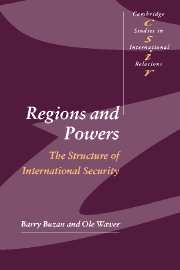Book contents
- Frontmatter
- Contents
- List of illustrations
- Preface
- List of abbreviations
- 1 Patterns of regional security during the Cold War
- 2 Patterns of regional security post-Cold War
- Part I Introduction: developing a regional approach to global security
- Part II Asia
- Part III The Middle East and Africa
- Part IV The Americas
- Part V The Europes
- Introduction
- 11 EU-Europe: the European Union and its ‘near abroad’
- 12 The Balkans and Turkey
- 13 The post-Soviet space: a regional security complex around Russia
- Conclusions: scenarios for the European supercomplex
- Part VI Conclusions
- Glossary
- References
- News media
- Index of names
- General Index
- CAMBRIDGE STUDIES IN INTERNATIONAL RELATIONS
Introduction
Published online by Cambridge University Press: 05 December 2009
- Frontmatter
- Contents
- List of illustrations
- Preface
- List of abbreviations
- 1 Patterns of regional security during the Cold War
- 2 Patterns of regional security post-Cold War
- Part I Introduction: developing a regional approach to global security
- Part II Asia
- Part III The Middle East and Africa
- Part IV The Americas
- Part V The Europes
- Introduction
- 11 EU-Europe: the European Union and its ‘near abroad’
- 12 The Balkans and Turkey
- 13 The post-Soviet space: a regional security complex around Russia
- Conclusions: scenarios for the European supercomplex
- Part VI Conclusions
- Glossary
- References
- News media
- Index of names
- General Index
- CAMBRIDGE STUDIES IN INTERNATIONAL RELATIONS
Summary
Throughout its history, Europe has experienced a limited number of decisive structural changes. In various periods the continent has tried out most of the forms a region can take: centralised, fragmented, overlaid, and itself overlayer of most of the world. Furthermore, it has been through processes of mergers of and redifferentiation into several RSCs. During the Cold War the Soviet Union moved up to the global level becoming co-constitutive of the 2 + 3 world. Thus Russia was lifted out of Europe, and had no RSC around itself (due to its direct dominance of potential members). In the current 1 + 4 world, Europe has two of the four great powers, but in contrast to Asia they are members of separate RSCs. After the end of the Cold War, Europe has wavered between a formation as one, two, or three complexes. In the first post-Cold War years, a large ‘OSCE’ Europe began to form which included Russia, but the latter increasingly drifted off to become the centre of its own RSC. The Balkans for a while looked as if it formed a distinct RSC. This development ultimately did not materialise, and Europe now consists of two centred RSCs which have decisively curbed its traditional power balancing and friction. The geographical closeness of Europe's two great powers (EU and Russia) makes a reunification of the two complexes a possibility and today they form a loose supercomplex. The Baltic states are the most important zone of contact, but generally the EU and Russia are not enough involved in each other's security issues to turn ‘Europe’ into one large RSC.
- Type
- Chapter
- Information
- Regions and PowersThe Structure of International Security, pp. 343 - 351Publisher: Cambridge University PressPrint publication year: 2003



